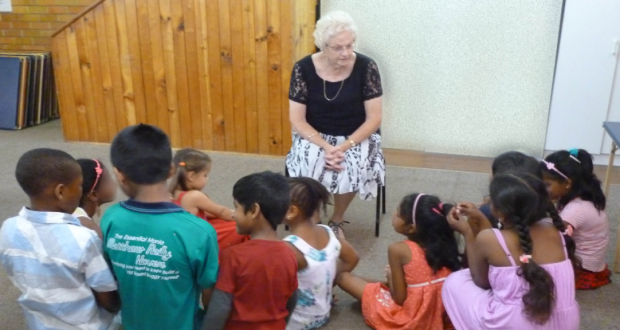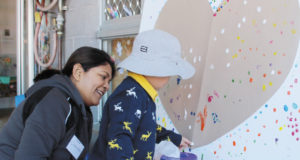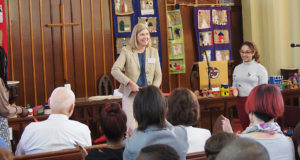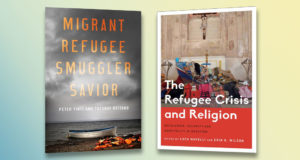What would it take for your church to become a place of refuge? Think carefully, because God’s hospitality demands that we welcome the outsider with open hearts and minds. Dianne Jensen reports.
Kieran is an ex-prisoner who went looking for a church where he would be welcome. He was a new Christian whose life had taken a radical about-turn in prison, and he needed a spiritual community which would offer a safe space.
The inner-city congregation at Wesley Mission Brisbane Albert Street Uniting Church became the refuge Kieran needed. The congregation is led by Rev Dan Skippen, whose wife Beatriz Skippen is Senior Chaplain State Coordinator for UnitingCare Community Prison Ministry.
“[At Albert Street] there was no reason for me to be anything else except what I was and that was a great relief,” says Kieran. “That’s an important thing for someone who needs help to reintegrate into society.”
He now works as a volunteer and part-time employee at Prison Ministry. The job includes connecting former prisoners with churches through the Onesimus Second Chance program, an initiative based on Paul’s challenge to Philemon to care for Onesimus (Philemon 1: 8–18).
Kieran knows first-hand that inviting others to step into our lives is an act of faith.
“In my case, my crime involved property and I was solely involved in what happened. That’s not true of everyone. And it’s completely understandable that it would be difficult and challenging for an individual church to open its doors to all. But I don’t think that there is another group or belief or philosophy which is better suited to offering that refuge than a Christian church,” he says.
“I don’t know what other people see in the Bible but I think it says clearly that Jesus came for the sinners, not the righteous. It [the Bible] tells me that there’s nothing that you can do that will make God love you more or less. So if the righteous person finds that applicable, how could they not apply that to someone else?”
It’s not easy to walk through those church doors, and Kieran says that it is important to remember that the right to privacy is fundamental to those who have experienced disempowerment.
“Refuge means choice. Freedom. A welcoming church community lets the person coming in disclose as much or as little as that person feels comfortable with. It’s not necessarily useful for a person with the best of intentions to come over and say ‘Tell us all about it so we can forgive you’,” he says.
“I’ve seen faith-filled people bumble around these issues. And it would be better for them and the community to take a step back and take things quietly. Quietly ask God, and sit with the question: ‘What do you want me to do with this person, with this situation?’ And if the answer is nothing, just to sit next to them in church, well that might be all that is required.”
Prison Ministry Senior Chaplain Beatriz Skippen is passionate about congregations providing safe places for ex-prisoners. She knows that there is a lot of trepidation on both sides.
“Hebrews 13:3 says, ‘Remember those in prison as if you were their fellow prisoners, and those who are mistreated as if you yourselves were suffering’. Scripture doesn’t say any particular congregation. It’s an invitation to the body of Christ. Prison Ministry can journey with congregations willing to support an ex-prisoner. When the congregation has an emphasis on restorative justice, and the process is well implemented, there can be positive outcomes for both parties.”
Beatriz reminds us that churches are places for new beginnings.
“A local church community is a place where people from all journeys can feel accepted and respected; where broken people have the opportunity to start again without judgement. A church can be a place where there’s a tangible peace, like a place of refuge; where there’s no discrimination for who they are or what has been in their past.”
There’s always room at our place
When the Tamil families first turned up two years ago to worship at Aspley Uniting Church in Brisbane’s northern suburbs, they sat almost unnoticed in the back row. After a few weeks people began leaving food and clothes for them.
Rev Subramaniam Manopavan (Mano) recalls that the mainly elderly congregation were friendly but a little unsure about what to do with real live “boat people”.
“They came without a single word of English and they were totally dependent on the congregation, who did everything possible to make them feel welcome,” says Mano, who is Sri Lankan-born. “There was also some curiosity … the Aspley congregation never had such a thing happen to them to my knowledge, so this was a totally new experience and they grabbed it.”
The two families have eight children: one couple with four children (one born in Australia last year) and the other couple with two children plus two nieces orphaned by the ongoing violence in Sri Lanka. Both families are being housed by the Red Cross but have limited resources and no work visas.
Currently the older children are attending the local primary school and one pre-schooler is being sponsored by the congregation to attend the Aspley Early Childhood Education centre operated by the Aspley Uniting Church.
After the initial outpouring of help, relationships began to form and the newcomers became part of the church community, says Mano. The Sri Lankan mothers brought food along to celebrate birthdays and people greeted each other with a hug.
“The children come and sit with some of the older people, and some of the families spend a lot of time with them [the Tamils]. They really show affection to these little children and wonder where they are if they don’t come on a Sunday … When they had the baptism for their children I did it in Tamil and they appreciated it very much, the whole congregation appreciated it too.”
The influx of children has boosted the Sunday School, which now has a dozen or so attendees and regular holiday activities run by volunteers.
The children are enthusiastic about their new church community, as one explains:
“I’m happy because the church people treat us like a part of their church members. The church people help me to forget my old things and treat us like other families.”
Katy Edwards, who is the congregational elder for the two families, says that the personal stories of the families have helped many church members to understand the issues faced by asylum seekers.
“Both children and adults have been traumatised by doors battered down, guns at their heads and witnessing bloody beatings,” says Katy.
“Before you often heard people go on about the boat people and how they should be stopped and so forth … That ceased, people are far more understanding of what they have been through.”
Katy says there is growing disquiet among church members about the precarious situation faced by the asylum seekers as a result of government policies to deny them permanent residency or work rights.
Find out about the Prison Ministry Christmas activities to support prisoners and their families at uccommunity.org.au/prison-ministry or call 07 3867 2550.
For more information about asylum seekers contact Synod Research Officer sue.hutchinson@ucaqld.com.au or call 07 3377 9774.
 JourneyOnline
JourneyOnline







